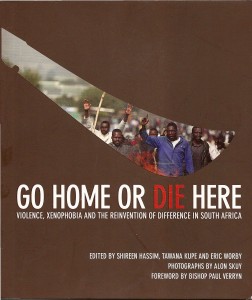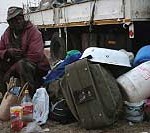What had tongues wagging was citizen’s journalism, dispatches by ordinary folk about electoral irregularities from the Rovuma to the Maputo rivers.
Good stuff: government cars illegally used for campaigning, [...]]]>

The sisters can do it by themselves. By A. Vilanculos
The buzz in Mozambique during the recent elections was not the TV debate among presidential candidates debate (there is none) or their programs (all vague).
What had tongues wagging was citizen’s journalism, dispatches by ordinary folk about electoral irregularities from the Rovuma to the Maputo rivers.
Good stuff: government cars illegally used for campaigning, with cellphone pics of their registration plates (until officials wised up and started covering up plates and ministry logos with party posters). Reports of youth tearing downs other party’s posters, fistfights, intimidation, and police lack of impartiality.
On election day, people told of late opening of polling booths and misbehaviour of poll officials and party observers.
Information was relayed by a network of 110 correspondents in 11provinces (most community radio reporters) and concerned citizens who texted, phoned and emailed.
The information was fact-checked and collected in a daily bulletin produced by the Centro de Integridade Publica (an NGO anti-corruption monitor).
The bulletin, in Portuguese and English, was emailed as pdf to some 3,000 subscribers, who redistributed it to at least double this number, and was widely reproduced, for free, by the local press, especially the 60+ community radio stations.
This was watchdog citizen journalism at its best.
Thanks to the Bulletin, Mozambicans had balanced coverage of the pre-poll partial exclusion of the new kid in the block, the opposition MDM, of the instances of ballot box stuffing and the invalidation of 100,000 votes.
The Bulletin provided a credible, professional and impartial source of information, above party politics (Mozambican media is aligned with political parties, ideological blocs and economic interests).
Bits of similar projecst exist elsewhere in Africa but I don’t know of any other so well-rounded.
In Kenya, during the post-electoral conflict two years ago, people texted and phoned in reports of violence to a hotline set up by an enterprising NGO. The information was quickly confirmed and uploaded onto a web map. The press, donors, and people could keep tabs on which parts of Kenya were burning.
Ghana made good use of sms by citizen correspondents during its recent elections.
Imagine if women developed such a tool.
Imagine that the 50-50 Campaign for equal political representation in Malawi could track women candidates during the campaign and the polls, and keep tabs on the insults, the stone-throwing, and the intimidation of women candidates seen last year.
In South Africa, during the 15 days against Violence against Women that started this week, a daily bulletin could keep track of gender-based abuse, collecting reports from police, rape crisis centres, and shelters. This would provide a graphic picture of South Africa’s second epidemic, after AIDS.

Grab it now! Pic b y A. Vilanculos
Historically, women are the last to use new technologies. This time, we should grab it now!
Check the Take Back the Tech site for cool ideas on taking control of digital technology to end violence against women.
And not only digital – one idea I liked is to go for a walk with a chalk and write up your thoughts on public space.
Watch the sidewalks of my neighbourhood in Pretoria – have chalk and thoughts, will walk.
* Read IPS stories on femicide in Chile, forced sterilisation in Peru and gender-based violence elsewhere.
]]>The UN has finally decided to stand up for women! A decision to create a new agency for women was taken by the General Assembly on September14.
Our colleague Thalif Deen, IPS bureau chief in New York, was the first and only journalist to report it for the [...]]]>

A breakthrough for us as well? M. Sayagues
The UN has finally decided to stand up for women! A decision to create a new agency for women was taken by the General Assembly on September14.
Our colleague Thalif Deen, IPS bureau chief in New York, was the first and only journalist to report it for the first several hours.
But this blog is not to crow about our scoop.
I’m quite excited by the prospect of a new women’s agency with money and political power. No longer will the world’s feminists have to lobby from the outside to put their views on the table. They have now won admission to the high table.
Any one of those bright, articulate, activist women can emerge to lead the agency. The reality is likely to be less rosy. But chances are that, because it’s new, it will be less under the thumb of the old boy network.
You think I’m a romantic? What the hell, there is no harm in dreaming, is there? I like to think that there was no way that the General Assembly could have once again shelved the plan for a new women’s agency.
It’s 14 years since Beijing. All the small and big things that governments were forced to accept around women’s rights (CEDAW, MDG, etc.) made it impossible for any country to block the efforts of myriad initiatives (from small grassroots groups to reforms in government policies even if they started as mere tokenism) and to politicise the cause of gender equality.
I do see great hope in the increasing presence of women in politics – Liberia, Japan, India, wherever you look, even Iran (new ministers) and the Gulf (Saudi Arabia has made a few small concessions to women!).
Of course, there is a backlash too – more violence against women worldwide.
As IPS gender editor, I am sure we will keep track of the new agency as it will be a key player achieving the MDG3 goal – gender equality.
Well, hope springs eternal!
]]>Have you seen the Italian documentary Il corpo delle donne (available with English subtitles)?
It is horrifying, like a horror movie.
“Women –real women— are an endangered species on television, one that is being replaced by a grotesque, vulgar and humiliating representation,” says an introduction to the documentary [...]]]>
Have you seen the Italian documentary Il corpo delle donne (available with English subtitles)?
It is horrifying, like a horror movie.
“Women –real women— are an endangered species on television, one that is being replaced by a grotesque, vulgar and humiliating representation,” says an introduction to the documentary by Lorella Zanardo.

This picture shows a woman hanged from the ceiling, like a ham, surrounded by legs of ham. This and other images, taken from real TV shows, speak for themselves.
Il corpo delle donne is a 25-minute terrifying documentary that undresses the degradation of women in Italian television.
“This led us to select television images that share a common manipulative exploitation of the woman’s body, to let people know what is happening –not only people who never watch television, but especially those who watch it but ‘don’t see’,” says the introduction.
Why aren’t women, and men, rallying against this treatment?
Link with Il Corpo delle Donne in Facebook.
]]>What if another wave of xenophobic violence unfurled, like the one that shook South Africa to the core a year ago? It left 50 dead and about 150,000 displaced, [...]]]>
 When friends ask me about the World Soccer Cup in South Africa in June 2010, I say there is only one if, but a big if.
When friends ask me about the World Soccer Cup in South Africa in June 2010, I say there is only one if, but a big if.
What if another wave of xenophobic violence unfurled, like the one that shook South Africa to the core a year ago? It left 50 dead and about 150,000 displaced, terrified and destitute immigrants – black, African and foreign. (Click here to see a slideshow)
The army stepped in and the violence subsided. But xenophobia still simmers. In June, IPS reported on yet more murders of Somalis in the Western Cape province. These are so common – 52 in 2008 – they don’t even make national news. Only a really gruesome murder of Somalis – a mother and her children killed and dismembered in their spaza shop last year – makes the front page. Otherwise, murdered Somalis earn only a short news item.
Zimbabweans, Congolese, Tanzanian, Ethiopians and Bangladeshis were also murdered this year – shot, burnt alive, and pushed off a sixth floor from Durban to Cape Town.
“Violence against foreigners is rapidly becoming fully integrated into the standard politics of some townships,” Loren Landau, director of the University of the Witwatersrand’s Forced Migration Studies Programme, told IPS.
A recent report by the Consortium for Refugees and Migrants in South Africa notes that there were no convictions for rape and murder committed during the 2008 attacks, sending a message of impunity.
The report “Protecting refugees, asylum seekers and immigrants in South Africa” says there is little reason to believe that attacks against “outsiders” will not happen again.
For now, the country is in honeymoon period with the new government elected in April on a platform of service delivery and job creation, topped with the success of the soccer Confederations Cup in June.
But if disappointment over unmet expectations coupled with recession sets in, frustration could turn into xenophobic violence.
Violent masculinities
Earlier this year, an insightful and distressing collection of essays, “Go Home or Die Here”, analysed the 2008 attacks.

Photo: IPS
From a gender perspective, the authors argue that “negrophobic xenophobia is couched as a battle between two sets of men. (…) the anxieties provoked by economic exclusion and social fragmentation have found expression in violent masculinities, in which weapons are an extension of maleness, and women are no more than bodies to be possessed.”
The striking photos by Alon Skuy illustrate this point. Most are men – rioters armed with sticks and machetes, rifle-toting policemen, bloodied corpses. The few women are at camps for the displaced.
The book’s graphic layout is so sleek that I found it disturbing – a coffee table book on xenophobia? It is borderline with the glamorisation of violence – the gold light bathed photos of angry young men grinning as they chase hapless foreigners.
The photos gave me the same eerie feeling I had in the cholera camps of Goma, in the aftermath of the Rwandan genocide in 1994. Talking to genocidaires, I felt in them pure hatred and a taste for violence. “The problem is that we didn’t kill all the Tutsi cockroaches,” one told me.
The Consortium report notes that “rumours of groups mobilising to finish the job started in May 2008 (…) may easily lead to further violence and displacement”.
If that happens, don’t expect many Africans to come watch soccer in South Africa in 2010.
]]>Technorati Profile
Their [...]]]>
Technorati Profile
Their pre-nuptial agreement stipulates that he will spend five days a month with her in her village and the rest with his first wife, who will get 80 per cent of his modest salary.
 The newly weds: a polemic union. Photo:Mukhtar Mai Women’s Welfare Organisation |
Nice sisterhood touch – weird nonetheless. Mai says she married because he was threatening to commit suicide if she didn’t. Her marrying a polygamist dismayed women activists in Pakistan. To me, the mind-boggling issue is the union to an obsessed man. In many countries, that threat would earn him a restraining order and psychotherapy. Here, it earns him a wife.
The heroine who refused to be a victim of her rapists submits to emotional blackmail. Her lawyer says Mai sought an alliance with a man of a powerful tribe, because the trial of her rapists is floundering. On the plus side, that a raped woman finds a husband who cherishes her is groundbreaking in Pakistan.
The truth will emerge sooner rather later, the reasons why this courageous activist, who runs her own NGO and had the support of the women’s movement in Pakistan, who starred in a documentary, wrote a memoir published in English and French, was Glamour magazine’s Woman of the Year and spoke at the United Nations, chose this marriage.
He is clearly smitten with her. She does not mention loving him, only family (his and hers) pressure. I’d like to ask her: do you love him, or think you may grow to love him, or is love for your husband a consideration at all? Maybe not. Romantic love is a social and cultural construct. Arranged marriages can grow strong, respectful and loving bonds among spouses. We wish the newly weds well.
Time will tell if five days a month is enough, too little – or too much.
This curious episode highlights how, for many women across the world, marriage is the only way she can feel safe, respected, provided with a roof over her head. The ways of the heart are mysterious and manifold; so are gender relations.
]]>